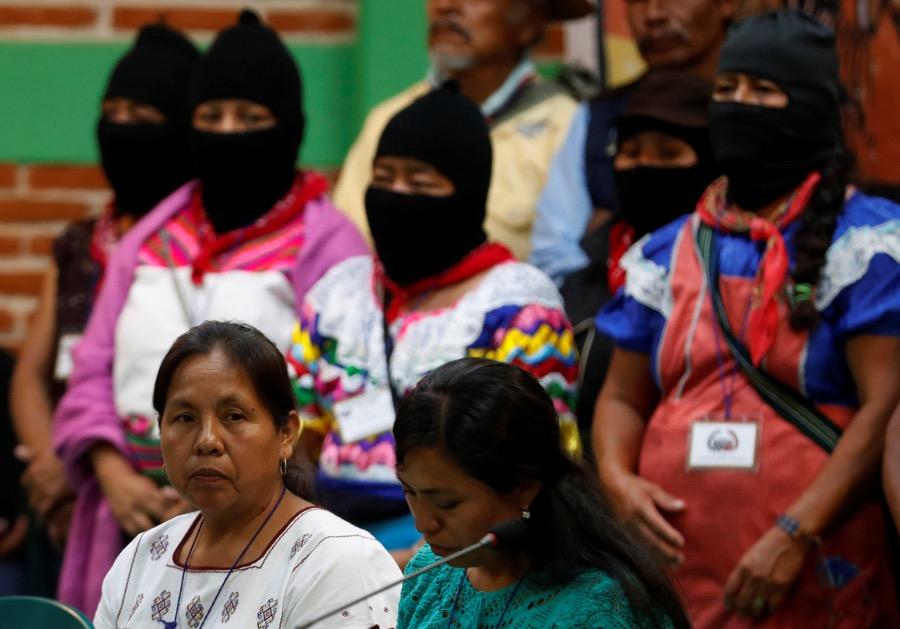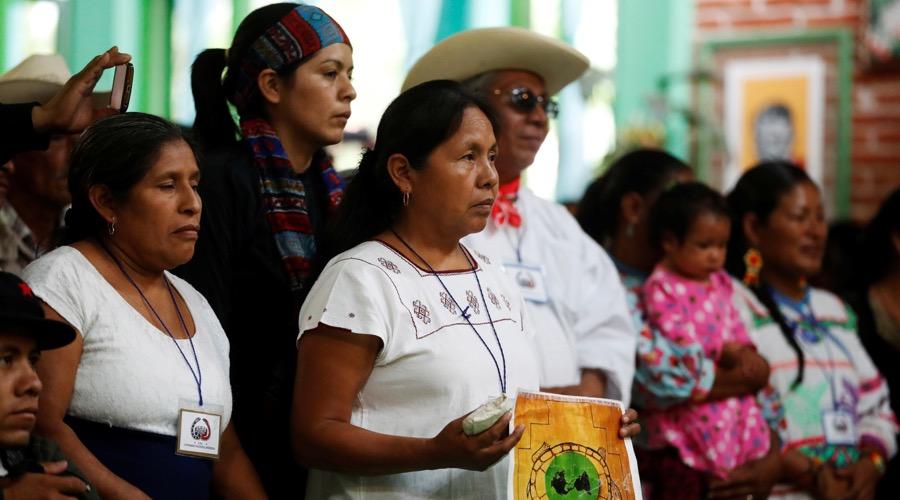Mexico has its first indigenous woman candidate for president
María de Jesús Patricio, is pictured here, center, during her campaign launch for president of Mexico in San Cristobal de las Casas, Chiapas, on May 28.
For the first time in Mexican history, an indigenous woman is running for president. The country hasn’t had an indigenous president for 145 years, and a woman has never held the highest office. But gender and heritage aren’t the only aspects that set María de Jesús Patricio apart from her contenders.
“Marichuy,” as she’s known, is a 57-year-old traditional Nahua healer from southern Jalisco. She isn’t backed by a political party, but rather by the Indigenous National Congress, which groups together representatives of dozens of nationalities and tribes from across Mexico. And she says that winning the presidency — or even getting votes at all — isn’t the aim of their venture into the electoral arena.
“Our participation is for life; it’s to bring together our communities that have been hit hard for years and years and that, I think, right now need to look for a way to keep on existing,” Patricio told followers and reporters gathered in Chiapas last weekend.
She clarified that the effort isn’t just for indigenous people, but for Mexicans from all walks of society, “to join forces to be able to destroy this system that is generally finishing us all off.”
Her candidacy also has the backing of Mexico’s Zapatista National Liberation Army. The rebel army — famous for its black ski masks and its spokesperson once called Subcomandante Marcos — led an uprising in 1994 in the southern state of Chiapas to demand rights for indigenous people.
Like the Zapatista uprising, the move to put an indigenous woman on the July 2018 ballot is a swipe from below at Mexico’s dominant economic, political and social order. The campaign promises to be anything but politics as usual and draws on indigenous governance philosophies and communalism, rather than polling, focus-group testing or other usual tactics. It also comes at a time when Native groups worldwide are fighting to defend their rights and territory from interests that seek to profit from resources on their ancestral lands.

As a traditional healer, Marichuy has the kind of skills learned at the side of other healers who pass down their knowledge to younger assistants, who are often relatives. Forests and fields are their pharmacies. They depend on trees and plants within thriving local ecosystems to cure their communities. It’s just one example of why maintaining a healthy environment is a core value for so many indigenous cultures.
Marichuy became involved in Zapatista-inspired struggles at least as early as 1996 when she participated in the formation of the Indigenous National Congress, known by the Spanish acronym CNI. In 2001, she spoke before the national legislature in Mexico City about the situation of indigenous women nationwide — a hearing that most lawmakers at the time opted to skip.
Throughout the campaign launch event, Marichuy’s cohort referred to her as “spokesperson,” never “candidate” — a key little detail that speaks to the collective nature of the effort.
That aspect may be particularly hard for people accustomed to party politics to understand. It comes from traditional governance models used in indigenous communities, where collective bodies like popular assemblies outrank individual positions like mayor.
The CNI says its newly formed Indigenous Government Council will adhere to a seven-point philosophy: serve and not self-serve; construct and not destroy; obey and not order; propose and not impose; convince and not conquer; work from below and not seek to climb; represent and not replace.
“We’re not going out to ask for votes,” says Bettina Cruz, an indigenous Binni Zaa from Oaxaca and a council member. The point of getting a candidate on the ballot, she explains, is to use the attention surrounding the electoral process to organize at a grassroots level across the country.
“The Indigenous Government Council and our spokesperson are inserting ourselves because we’re also part of this country, and we’re going to speak out,” she says. “Our proposals are about organizing, about rescuing the country and about a way of life that’s new and different from the one that’s dragging us into a debacle of civilization, not only on a national level but all of civilization.”
The campaign comes at a time when indigenous communities across Mexico, and worldwide, are engaging in multiple disputes over resource extraction on their land. This can include government-backed activities — like building an aqueduct or issuing permits to foreign mining companies against local wishes — to illegal logging of old-growth forests by organized crime groups. The disputes pitting indigenous self-determination against the pursuit of profit within their territories is what the Indigenous Government Council calls a “capitalist war.”
An openly anti-capitalist presidential campaign is significant in Mexico. The oil-and-gas-producing country joined the Organization for Economic Cooperation and Development, a club for advanced economies, over 20 years ago. And it has strong economic ties to its largest trading partner, the United States. While NAFTA has been a divisive issue, railing against capitalism outright is something that hasn’t gained much of a foothold in high-level Mexican politics.
Related: Trump's gamble: Mexico could actually gain more from a NAFTA redo
But recent global electoral upsets have shown that the unexpected cannot be written off as impossible.
Many analysts have been murmuring that the 2018 election may be the third-time charm for Mexican leftist politician Andrés Manuel López Obrador. The strong showing and surprise wins by his relatively new Morena party were among the big stories of Mexico’s state-level votes last year.
Turnout is frequently low in Mexico, often with only about a third of eligible voters heading to the polls. A form of electoral protest has been gaining steam over the years: casting a purposely spoiled ballot, called voto nulo in Spanish. In some parts of the country, the voto nulo has taken a greater portion of the vote than small parties.
Perhaps some Mexicans who usually abstain or spoil their ballot will end up casting votes for a candidate as far outside the mainstream system as María de Jesús Patricio. But, like she says, getting their vote isn’t the point.
